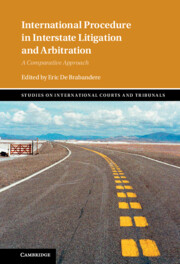Book contents
- International Procedure in Interstate Litigation and Arbitration
- Studies on International Courts and Tribunals
- International Procedure in Interstate Litigation and Arbitration
- Copyright page
- Contents
- Contributors
- Introduction
- Part I Pre-hearing and Selection and Appointment of Judges and Arbitrators
- Part II Post-commencement Litigation Procedure and Strategy
- 5 Interim Measures
- 6 Procedural Challenges and Strategies before the ICJ and ITLOS
- 7 Achieving Greater Access to Justice through Cost-Efficiency
- 8 Opening Up International Adjudication
- Part III Evidence and Witness
- Part IV Post-hearing and Effect of Decisions
- Index
5 - Interim Measures
International Tribunals As International Organisations*
from Part II - Post-commencement Litigation Procedure and Strategy
Published online by Cambridge University Press: 18 November 2021
- International Procedure in Interstate Litigation and Arbitration
- Studies on International Courts and Tribunals
- International Procedure in Interstate Litigation and Arbitration
- Copyright page
- Contents
- Contributors
- Introduction
- Part I Pre-hearing and Selection and Appointment of Judges and Arbitrators
- Part II Post-commencement Litigation Procedure and Strategy
- 5 Interim Measures
- 6 Procedural Challenges and Strategies before the ICJ and ITLOS
- 7 Achieving Greater Access to Justice through Cost-Efficiency
- 8 Opening Up International Adjudication
- Part III Evidence and Witness
- Part IV Post-hearing and Effect of Decisions
- Index
Summary
This chapter examines the conditions under which international tribunals may issue orders for interim measures in contentious cases in order to preserve the parties’ respective rights pending final judgment on the merits of the case. It contends that tribunals influence one another in their practice. The chapter first considers whether international tribunals can be categorised as international organisations. It starts by examining relevant jurisprudence of the International Criminal Court (ICC) which has explicitly addressed this issue and affirmed its institutional nature. Although it is not competent to entertain disputes which involve states, the view expounded by the ICC is applicable mutatis mutandis to other international courts and tribunals. Drawing on Eli Lauterpacht’s notions of cross-fertilisation and parallel instances, and employing principles of international institutional law, primarily maxims of constitutional interpretation and the doctrine of functionalism, this chapter then addresses whether these in themselves provide a foundation for a general claim that interim measures orders are binding and impose obligations on the parties to which they are addressed. This involves a close analysis of the LaGrand case. The underpinning premise is that if international tribunals are conceived as international organisations, they have a degree of autonomy in determining the parameters of their competence which is detached from the intentions of their authors. The chapter then turns to the influence exerted by the International Court’s practice concerning interim measures on that of other international tribunals in matters such as the requirements of urgency and irreparable prejudice as prerequisites for the indication of measures. It concludes by noting that this process is dynamic as developments in the practice of one court may be received by others. This is illustrated by the adoption of the notion of ‘plausibility’ by international tribunals once this criterion had been enunciated by the International Court of Justice. As a parting shot, possible normative bases for this exchange of practice are briefly canvassed.
Keywords
- Type
- Chapter
- Information
- International Procedure in Interstate Litigation and ArbitrationA Comparative Approach, pp. 141 - 175Publisher: Cambridge University PressPrint publication year: 2021

